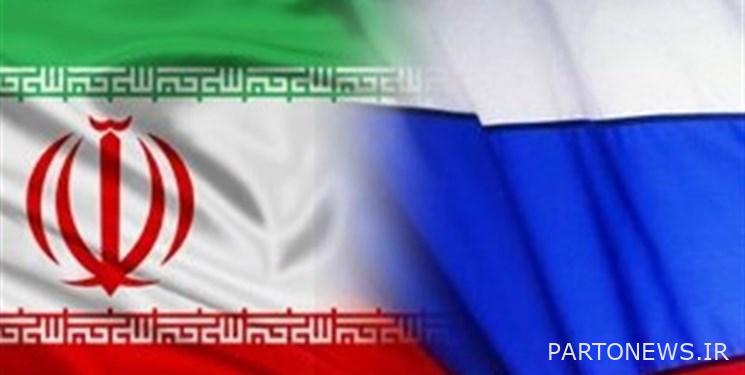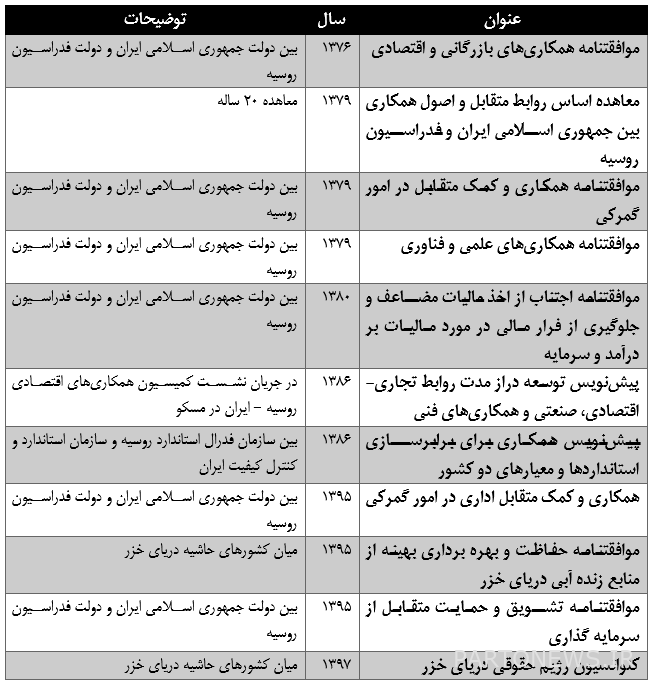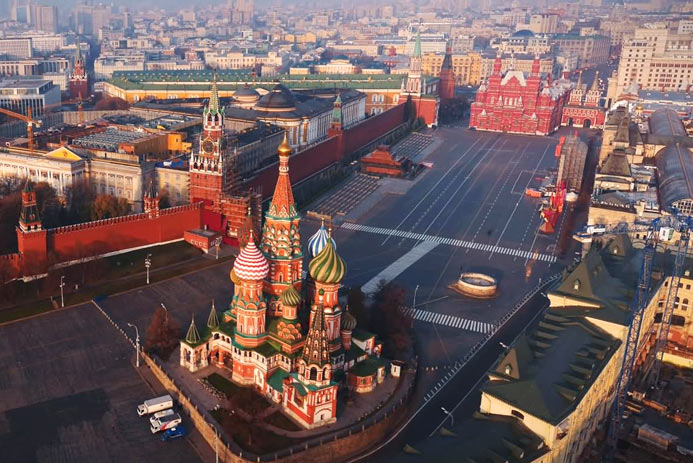Red Square -1 | The ups and downs of Iran-Russia relations in the last two decades / Will the Russians become a trade ally of Iran?

According to Fars News Agency’s economic correspondent, expanding international trade and economic relations and increasing non-oil exports are very important for a country like Iran, which is under sanctions, because on the other hand, by diversifying sales markets and tying its interests with other countries, pressures and restrictions It moderates the effects of sanctions and, on the other hand, helps increase production and the prosperity of the domestic economy.
Undoubtedly, Iran’s main priority is the expansion of foreign trade and international economic cooperation with neighboring countries and the region, and in the form of bilateral trading partners. Russia, the northern neighbor of the Islamic Republic of Iran, is one of the emerging economies of the last decade, which experts believe has the potential to expand trade within the framework of a win-win interaction.
The Russian Federation, with a population of 146 million and imports of $ 231 billion in 2020, is one of the most attractiveMost Growing consumer markets in the world have become a significant part of this market can be occupied by Iranian goods and goods.
* Unfavorable situation of economic relations between Iran and Russia in relation to the existing capacity
But a re-reading of Iran-Russia relations reveals the fact that despite the two countries’ desire for strong economic ties and participation in political positions in many of the world’s political developments (being influenced by the bloc against the United States), obstacles have raised expectations. And the will of both sides in this important case is still not fulfilled. It seems that the idea that Russia can be considered a strong ally for establishing strategic relations with Iran in the economic and trade fields has not been formed in Iranian officials either.
Although the political-security and defense relations between Iran and Russia have been improving in recent years, despite the historical ups and downs, and according to experts, these new relations are unprecedented in the history of the two countries, but economically compared to the existing capacities. And the countries of the region, the state of interaction between the two countries is not to be expected.
As a result, it seems necessary to express economic-trade opportunities and capacities, analyze obstacles and provide solutions and proposals to remove obstacles and expand cooperation between Iran and Russia to a higher level of political-economic cooperation and strategic convergence in relations between the two countries. To be created.
* Review of relations between Iran and the Soviet Union before the collapse
Iran’s relationship with the Soviet Union during the Pahlavi period had various ups and downs. These relations were influenced by the atmosphere created by the rivalry between the two superpowers, East and West, and Iran’s efforts to establish relations with the United States had always kept relations with the Soviet Union dark.
But in general, Iran-Soviet relations had reached a relative stability by the time of the victory of the Islamic Revolution, despite some concerns and issues, but from then until the end of the Iran-Iraq war in 1988 due to the issue of Afghanistan and Moscow’s support for Baghdad It was fragile and unstable.
With the visit of the late Speaker of the Islamic Consultative Assembly Hashemi Rafsanjani to Moscow in 1989 and the signing of a $ 10 billion contract, new economic and technical cooperation was formed between the two countries, but it should not be ignored that relations between the two countries began in earnest in the mid-1990s. .
* Expansion of Iran-Russia interactions with the coming to power of Putin
After the collapse of the Soviet Union, due to the dominance of Atlanticist thought in Russia and the high priority given by Moscow officials to integration into international and Western institutions, Russian foreign policy in the first years after the collapse did not give the Islamic Republic of Iran a proper position. They were seen as a threat to their interests in Central Asia and the Caucasus.
Gradually, however, the Atlanticist attitude in Russia was called into question, and Russia developed relations with governments such as Iran in order to persuade domestic public opinion and demonstrate its independence in international relations. In general, in the conditions of confrontation and competition between Russia and the West, the ground is prepared for the expansion of Iran-Russia relations.
Repeated visits by the two countries’ officials at the ministerial level (foreign ministers, defense ministers and Security Council secretaries) and the 2000 summit in New York helped to create a new situation and to further strengthen the close relations between Russia and Iran. The visit of the then President of Iran Mohammad Khatami to Russia in 2001 and the agreement on basic cooperation with Vladimir Putin, caused the relations between the two sides to continue more seriously for the next decade.
A statement on the Caspian Sea was also issued during the talks between the two leaders on close economic cooperation. In April 2002, the Iranian Foreign Minister visited Moscow and exchanged ratified documents of the March 2001 agreement, and finally Putin’s visit to Tehran in 2008 and meeting with the Supreme Leader of the Islamic Revolution and then-Iranian President Mahmoud Ahmadinejad can be considered the culmination of these relations.
Economic relations between the two countries since 2000 Efficiency Putin, the visit of the then President of Iran to Moscow and the 10-year cooperation agreement between the two countries expanded even more; In 2005, Russia became Iran’s seventh largest trading partner. But with the transfer of power from Vladimir Putin to the pro-Western Dmitry Medvedev in 2008, Tehran-Moscow relations once again plummeted.
* The decline of relations between the two countries with the transfer of power from Putin to Medvedev
Although the first months of Medvedev’s presidency were accompanied by Russian military action in South Ossetia in August 2008 against Georgia, followed by a full-scale confrontation between Russia and the West, Medvedev went on to indicate that a period of Russian foreign policy had begun. It is the West.
“He and Obama Politics”RestartRussia’s diplomacy with Iran has become increasingly complex. Although it did not have the same duplicity as before, it has put more pressure on Iran.
Changing Moscow’s attitude towards Tehran, ﺗﺄثیر He was so vocal about Iran’s nuclear program that then-Iranian President Mahmoud Ahmadinejad criticized Russia’s actions toward Iran, calling Russia a “good policeman” among the P5 + 1. However, in June 2009, Moscow congratulated Mahmoud Ahmadinejad on his re-election as President of Iran, unlike Western governments.
Iran-Russia relations deteriorated in 2009-2010, despite Moscow’s support for Mahmoud Ahmadinejad. Amid strained US-Russian relations, the country has signed a $ 1 billion missile deal اس Had signed 300 to Iran. But with Security Council Resolution 1929 against Iran’s nuclear program, Russia suspended its delivery.
Western boycott of the Russians is a turning point in Iran-Russia relations over the past decade
Vladimir Putin سال year, while as president to the palace The Kremlin It turned out that Iran did not have good economic and international conditions. In the first year or two since Putin took office, these factors have prevented the resumption of Iran’s relations with Russia. However, over time, along with Iran’s negotiations with world powers within the framework of the P5 + 1, the escalation of the Syrian crisis and Russia’s increasing desire to play a role in it made the issue of regional cooperation the focus of Tehran-Moscow cooperation.
The two countries’ common approaches to Afghanistan, Iraq and Syria Sergey In September 2014, Lavrov called Iran a “natural ally” of Russia. Subsequently, with the creation of the Ukraine crisis and Western sanctions against Russia and, most importantly, Russia’s entry into the operational arena of the Syrian conflict, a new stage in Tehran-Moscow cooperation was formed and relations between the two countries in various political, economic and regional dimensions. Took.
Putin in November In 2015, he traveled to Tehran to attend a gas export meeting and met with the Supreme Leader of the Revolution for the second time. He was praised during the meeting for its support in the nuclear talks and its appropriate stance on the Syrian crisis. The leaders of the two countries also announced their readiness to turn Iran-Russia relations into a strategic one by expanding in all areas.
As a result of these events, the political will formed in Tehran and Moscow led to moves to expand economic cooperation between the two countries. But it must be said that with all the necessary will and measures, the volume of trade between Iran and Russia has not been commensurate with the capacities and capabilities of the two countries.
Figure 1
The chart above shows the trade trend between Iran and Russia. According to this chart, Iran’s exports in the period from 1988 to 1998 have always been less than $ 500 million. Mizelin Russia’s exports to Iran have also had many ups and downs, but have never reached the level of 1391.
So far, many economic and economic-political agreements have been concluded between Iran and Russia, which are listed in Table 1, but despite these agreements, there are still trade obstacles in the development of economic interactions between the two countries, which will not be resolved until resolved by the parties. Expressing willingness and concluding a contract does not untie the knot.
Table 1 – Some economic agreements between Iran and Russia

Has the embargo prevented the expansion of Iran-Russia interactions?
In general, it can be claimed that almost all the agreements reached to increase economic relations between the two countries of the Islamic Republic of Iran and the Russian Federation have remained on the ground and have not been implemented. Of course, the pro-Western current in Iran is trying to politicize these trade barriers and reinforce the notion in the public mind that “Russia is not willing to engage in economic interaction with Iran because of US sanctions.”
on file “Red SquareObstacles to the expansion of economic interactions between Iran and Russia will be examined to determine Has the embargo hindered the development of economic relations between Iran and Russia, or have some economic inefficiencies in the Eleventh and Twelfth Governments limited the capacity of these interactions? It is necessary for the 13th government to take action to remove these restrictions.
About the registration of this case, “Red Square” is the name of a famous square in the center of Moscow, the capital of Russia, to which many of Moscow’s main streets lead (Figure 2). Red Square is one of the most famous tourist symbols of Russia, which in addition to its tourist and historical attractions, is also the site of important political and social events in Russia.

Figure 2 – Moscow Red Square
In subsequent reports of the case «Red SquareWe will examine the obstacles to the expansion of economic interactions between Iran and Russia and the solutions to solve them.
end of Message/
.

